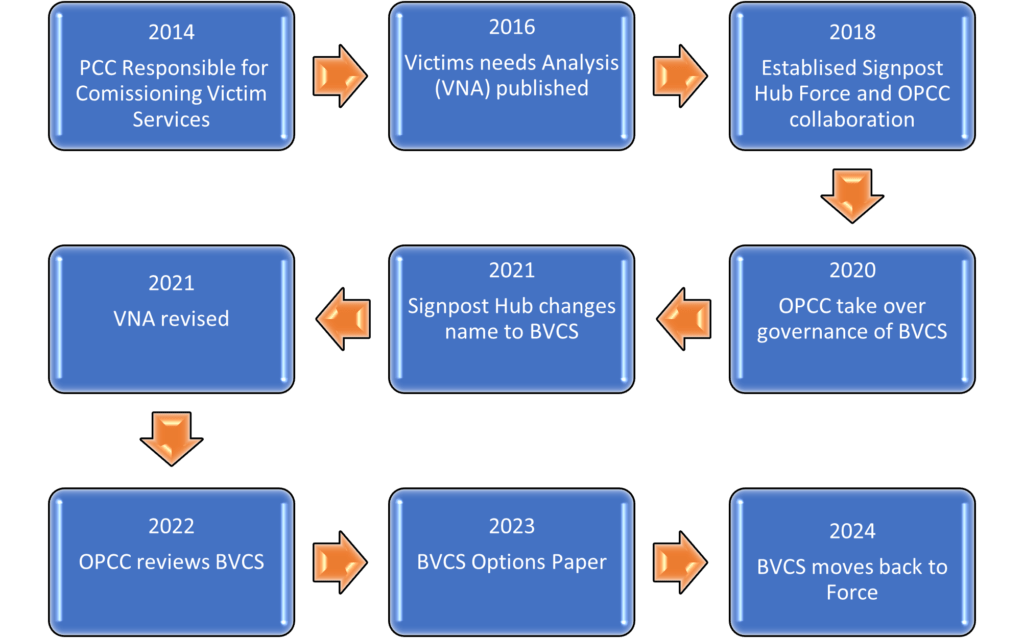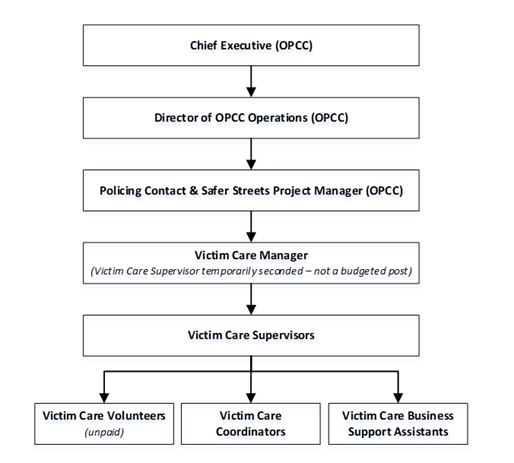Bedfordshire Police Headquarters
Bridgebury House, Woburn Road, Kempston, Bedfordshire, MK43 9AX
Bridgebury House, Woburn Road, Kempston, Bedfordshire, MK43 9AX
Title and Reference – PCC/D/130
Subject: Ownership of Bedfordshire Victim Care Services to return to Bedfordshire Police Force
Report of: Police and Crime Commissioner
Date: 16/02/2024
Summary:
This report details the decision taken to return Bedfordshire Victim Care Services (BVCS) to Bedfordshire Police Force with effect from 1st March 2024.
Introduction
The journey regarding the Victims Code of Practice (VCOP) in Bedfordshire is a critical topic of interest, particularly regarding its effectiveness and how the force and Office of the Police and Crime Commissioner (OPCC) have implemented it to date.
Victims Code of Practice (VCOP)
VCOP or Victims Code was established by the Domestic Violence, Crime and Victims Act 2004 and came into effect in 2006. It is the statutory code that sets out the minimum level of service that victims should receive from organisations in the Criminal Justice system. This includes but is not exclusive to the Police, OPCCs, Crown Prosecution Service (CPS) and victim support services. VCOP has been revised three times, most recently in 2020.
VCOP1 has 12 individual rights, which cover the period from the moment a crime is reported to the end of the trial. The code applies to criminal justice agencies such as the police and courts. The code ensures that victims should be kept informed about the progress of the case. The Victims’ Code sets out the minimum level of service victims can expect. It applies to victims whether they choose to report the crime or not.
The code entitles all victims to three rights regardless of whether the crime has been reported to the police, which includes:
the right to make a Victim Personal Statement.
the right to be informed about criminal proceedings.
the right to be referred to support services.
The Police and Crime Commissioner’s (PCC’s) key duties include supporting victims, giving them a voice, and ensuring the effectiveness of the criminal justice system in Bedford. These duties are set out in the oath of office, which is sworn by the PCC when they take up their term.
VCOP Right 4 states: ‘To be referred to services that support victims and have services and support tailored to your needs’.
The PCC currently does this by providing and funding the Bedfordshire Victim Care Services (BVCS).
History Overview

In 2014, Police and Crime Commissioners became responsible for commissioning services for victims to enable them to ‘cope and recover’ from the effects of the crime. It is right to say that this service has been on a journey since the first Victims Needs Analysis (VNA) was published in 2016.
The diagram above shows that in 2018 Signpost Hub (now BVCS) was set up in collaboration with Victims Services, Police and the OPCC until 2020 when the governance for Signpost moved solely to the OPCC.
In 2022 to make victims services easy for members of the public to identify with, find and access the name was changed from Signpost Hub to BVCS.
The VNA was reviewed and revised in 2021 creating a series of 28 recommendations in response to areas of change required, including process changes, cultural reviews, and approach of commissioned services across partnerships. It was clear that COVID-19 pandemic has had significant impact on the world of victim care and the VNA acknowledged that the impact and changes that have been made to cope for the duration and after the pandemic.
In February 2021 the Victim’s Minister, Dame Vera Baird QC released her report to Government to call for a new Victim Law and stated that: the falling confidence in the criminal justice system could only be restored by treating victims as participants rather than outsiders in events that could have been pivotal moments in their lives.
BVCS go through a consultation period to move them from Police HQ to Caudwell Street in Bedford this resulted in relocation taking place in April 2023.
The OPCC and BVCS also initiated a further review to understand the available resources within BVCS over a three-month period from March to May 2022, to establish their capacity to handle additional referrals. BVCS were given an aspirational target of achieving interacting and offering support to a minimum of 1000 victims of crime per month, this of course was reliant upon suitable staffing and receiving an appropriate level of referrals.
Current Structure
The Bedfordshire Victim Care Service currently falls under the management of the Office of Police and Crime Commissioner (structure pictured below).

Proposed Structure
It has been agreed that the new structure for the Bedfordshire Victim Care Service will be as follows:

Performance
Bedfordshire Victim Care Services has received a monthly average of 560 referrals for support during this financial year, with approximately 90% of these being made by Bedfordshire Police. Victims are offered practical and emotional support and where more specialist support is required, victims are signposted or referred to partner agencies and in this financial year 3737 of these onward signposts/referrals were made ensuring the victims received the support the needed.
The difficulty in evaluating the level of performance by BVCS is in some ways hampered by the varying models and approaches taken nationally in this area.
For example, colleagues in Hertfordshire3 deal with around 3500 victims per year, but there structure means that they almost have a “Cradle to Grave” approach and provide the majority of services from within their own team without the need to refer out to commissioned partners, the team are part of the Constabulary and has members of Police Staff, Police Officers and Volunteers providing support with a percentage of the costs being met through the OPCC via a grant fund (The majority of cost is met via Hertfordshire Police core budget).
An alternative to this is West Mercia Police who fund a police led Victim Advice Line (51,470 contacts in 2021) and continue to externally fund Victim Support to provide additional support services to victims.
Funding
Police and Crime Commissioners were given responsibility for commissioning support services for victims of crime in 2014 along with an annual grant from the Ministry of Justice. An amendment to section 56 of the Domestic Violence, Crime and Victims Act 2004 and the Anti-Social Behaviour Crime and Policing Act 2014 allows for this.
Historically Victim Support were provided with a grant of circa £250k per annum to provide a service to contact victims of crime within the county to ensure that any additional and ongoing needs that were required could be arranged and progressed. During a different PCCs term, it was felt that this arrangement was not sufficient, and an alternative method of delivery was implemented.
Annual allocation of funding is via MOJ core funding of £435k.
There is a regular report that must be submitted to the MOJ which provides data on the outcome review and drives the data that is collected within the team as would be expected and in line with any “Grant” recipient arrangement.
Decision
The Office of the Police and Crime Commissioner (OPCC) has taken various measures to ensure that the Victims Code of Practice is effectively implemented in Bedfordshire and as a result of several reviews, has taken the decision for BVCS to return to Force with support of the OPCC and volunteers. To strengthen victim service provision, with effect from Friday 1 March 2024, Bedfordshire Victim Care Services moved from the OPCC into Bedfordshire Police. This realignment of the service is an ideal opportunity to ensure the optimising of victim services across the Force and that the more cohesive approach brings about the best for the victims of crime.
Advantages:
This holistic model and approach to victim care, appears to be the most common around the country and demonstrates a joined-up approach. Forces have highlighted the benefits of being able to provide services with a combination of specialist police officers, specialist police staff and a strong and engaged compliment of volunteers with relevant skills and frequently lived experiences. Forces having responsibility in totality for this element of service seems to be the most appropriate and allows for a greater degree of scrutiny and oversight.
Forces with a strong volunteer element can benefit from greater resilience enabling them to carry out additional tasks such as surveys and follow up calls being more consistently provided.
BVCS are currently handling approximately 500-650 referrals a month (Referrals are not all received from Bedfordshire Police, there is a small element of Self-Referrals or Partner Referrals). There have been some logistical issues in terms of the ongoing need to “Push” for referrals from Police Officers due to a combination of issues with process and a lack of understanding of the services and support that BVCS offer. Officers and staff would be more likely to refer, enabling BVCS to increase number of victims referred and assisted.
Funding to the amount of £435k has been promised for at least the next 12 to 24 months with a view for efficiencies potentially thereafter. Any funding would be subject to the same degree of scrutiny and rigour as all other commissioned partners and services.
Over a period with this option, it may be possible for the Force to consider combining Witness Care and Victim Care together for a more holistic approach to the victim and case journey.
The implementation of these measures is crucial in ensuring that Bedfordshire continues to improve and increase the number of victims receiving the necessary care and support to enable them to recover from the impact of crime.
Recommendation:
To note decision

Bedfordshire Police HQ
Bridgebury House
Woburn Road
Kempston
Bedfordshire
MK43 9AX
Tel: 01234 842064
© Bedfordshire Police & Crime Commissioner 2024 – All rights reserved